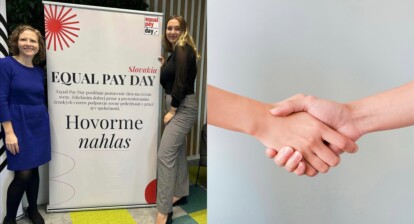The personality of the Slovak cultural scene, screenwriter and director Valéria Schulczova, is a co-author of several plays. In addition, she was involved, for example, in the series “Odsudene” and “Za sklom”. As a producer, she subscribed to the series “Horúca krv” or “Ordinácia v ružovej záhrade.” In the interview, she told us:
- Why direction is the domain of men,
- what she considers to be the most challenging work
- which serie is her favorite,
- what is unique about the Anómia 21 project,
- what makes exceptional Theater P. O. Hviezdoslav exceptional
You’re a director and a playwright. How did you get into these professions? Was it your dream?
In a way, it was my childhood dream. When I was 10, I wanted to be an opera director, which turned into a drama during high school. So I knew all through high school that I wanted to go to University of Art.
There are more men than women in your profession. Why do you think that is?
Because traditionally the theater was man’s business, even in the Elizabethan theater, both men and women played. Actresses are now self-evident, dramaturgists and stage artists too, and directors are gradually becoming the standard. Even during my studies at university, the Slovak theater circles were of the opinion that women could not master this profession. That they don’t have enough authority, or talent or lack the temperament.
What do you like best in your work and what is the most difficult for you?
My favorite one is the variety and social prestige that the theater can and should have. The intense energy is sometimes difficult, and it is striking. In the theater, it’s the dress-rehearsal weeks that are exhausting even mentally. And when you write scripts, they’re often gallows dead. It’s beautiful in the theater that you work with people and it can also be a stumbling block. If you do not meet someone mentally, do not meet the way of working together, communication and thinking can be an insurmountable problem.
 You’ve also worked as a creative producer on several TV shows. Which one do you like to remember?
You’ve also worked as a creative producer on several TV shows. Which one do you like to remember?
I think I like remembering “Odsudene”. It was my first series in Slovakia after returning from Prague. It was interesting both in content and in form, and we felt that we were creating something new, changing the paradigm of Slovak serial creation. Unfortunately, that was not the case. “Odsudene” was left alone with the swallow.
What kind of actors do you like best?
With those who have an opinion, intellect, humility and the will to work.
Follow us on Linkedin!
How did you manage the coronavirus period?
I don’t think it’s harder than other people. The problem in the theater is that we have consistently stopped all activities, we have only been able to do project preparation. I worked as a screenwriter, but with uncertain prospects, because no one knew when and if it would start shooting, and therefore no one knew if they actually needed ‘back-up’ scenarios.
You’re the author of the Anómia 21 project, try to introduce it to our readers. How did this idea come about?
Anómia 21 arose as an effort and a need to reflect what the pandemic has done to Slovak society. What effect it had on us, what trials it had accelerated, what it had uncovered mercilessly, and what it had changed. That is why we have reached out to seven authors to help us name this new reality of ours. This led to the creation of the original games and, subsequently, to the creation of seven staging teams, which in the course of June premiered seven new productions in the DPOH. This view of our presence is, in a way, cruel in its truthfulness, but it often takes the form of a humorous view, a viewer having the chance not only to think, but also to laugh.

What did you want to express about these projects? Can I take that as a criticism of the company?
It’s not primarily about criticism. It is an attempt to name our patterns of behavior, attitudes, tendencies and often animosities. Expose our fears, our anxieties and also what we are subject to, how we let ourselves be manipulated, what we believe in, and who we hate, and what we hate. Where we lie to each other and how we like to stick to the idea that taking responsibility is over-work.
What kind of actors can we see in these seven games?
Since the DPOH does not have its own set, we have reached out to actors from all the Bratislava theaters and all the students of the SCM. The cast is composed of familiar and less familiar faces, but they all accepted the offer because they were enthusiastic and tried with great enthusiasm and enthusiasm. It was no one’s duty, they worked with joy. And it’s not a phrase. The theater came to life after a long time and the meetings in the common areas had always had a certain kind of enthusiasm that it was possible to work again.
Right now, your plays are being played in Theater P. O.Hviezdoslav. What makes this theater so special to you?
It’s a great theater building. One of the best in Central Europe. And it’s also the theater where I saw my first play of my life. At the same time, I saw some of the best performances in the studio, and it shaped me as a future professional. So it’s a combination of a certain sentiment and the realization that I have the opportunity to create a really great theater, even though it’s not in the best shape right now. A lot of money needs to be invested in the building, as it has not been reconstructed for decades. It is also in an alarming state of theater technology.
Who do you personally think is a great director?
There’s a lot of them. I don’t have one idol, nor poetics.
When someone presents themselves in public, they sometimes also encounter negative comments or dishonesty. Have you been there?
Of course, I have. When you speak to the public, the public also speaks to you. Sometimes it’s hurtful, sometimes it angers you, and sometimes you try to get something constructive out of criticism. You think about what the audience is trying to do to you, often in anger or in rain. Not necessarily whether they’re right, but what really irritates them about your work.
What are your plans for the future? Do you have any dreams you’d like to pursue?
I have specific dramatic plans for the next season, and my dream is to make them happen. It sounds corny, but if the third wave of the pandemic comes, this dream will be bold, too.
What kind of activity can you relax or relax in?
On the road. Walking the dog and doing nothing. That’s what I like. The problem is, I can rarely afford one. Dolce far niente is currently being postponed indefinitely.
Try giving us three tips on how to achieve your dream.
- Believing in what I do,
- doing it to the full
- and not reliving yourself too harshly.







